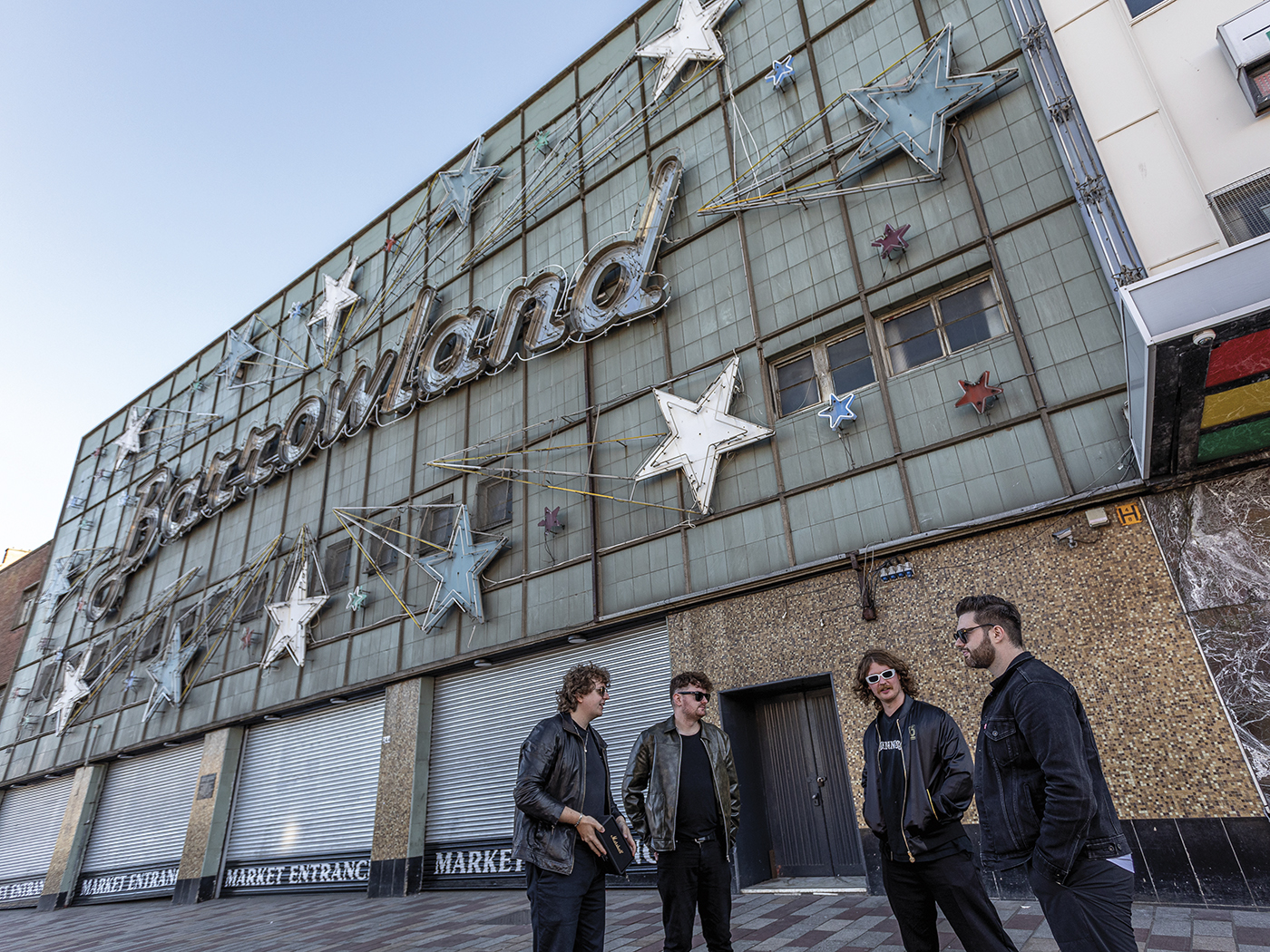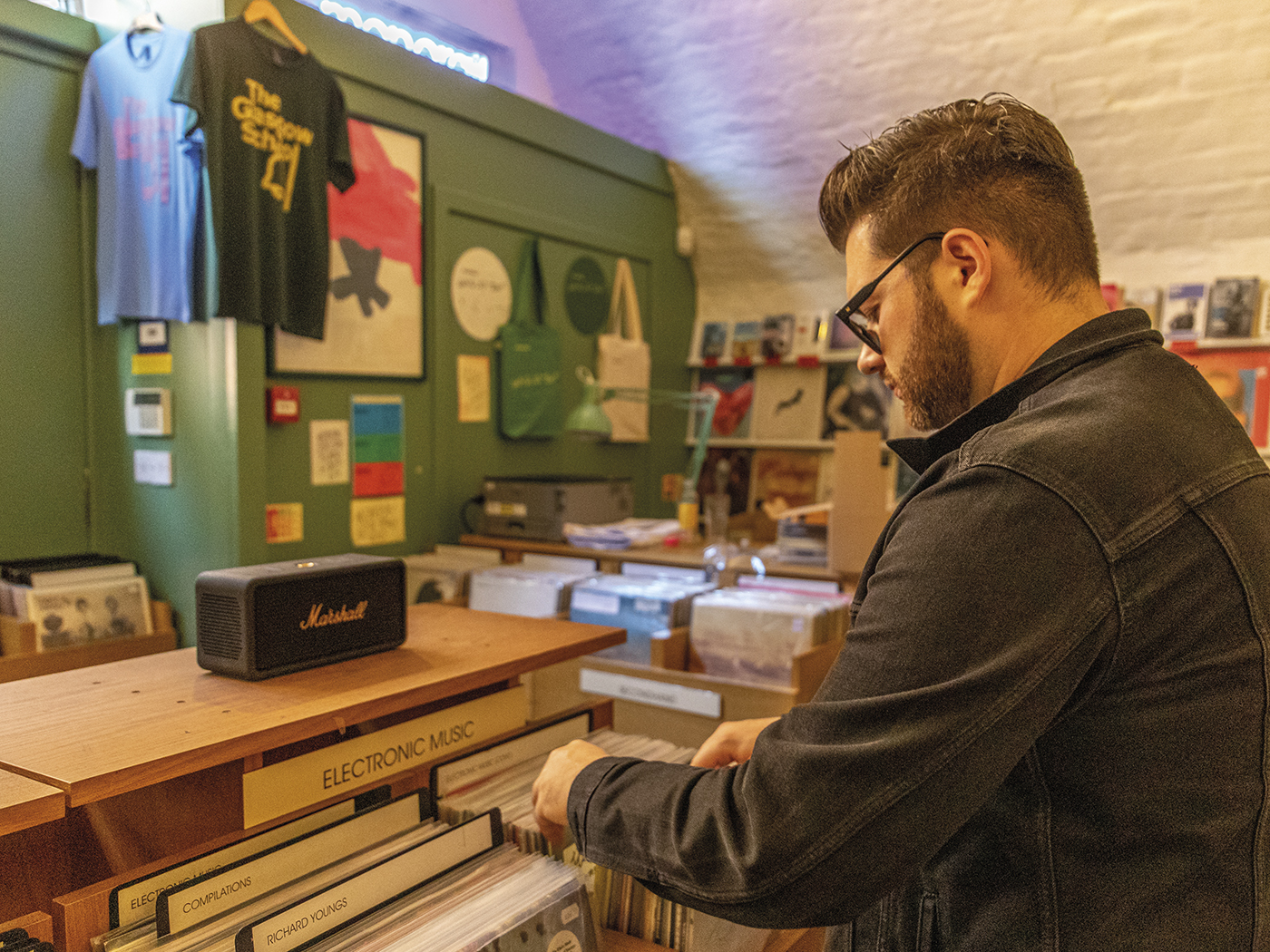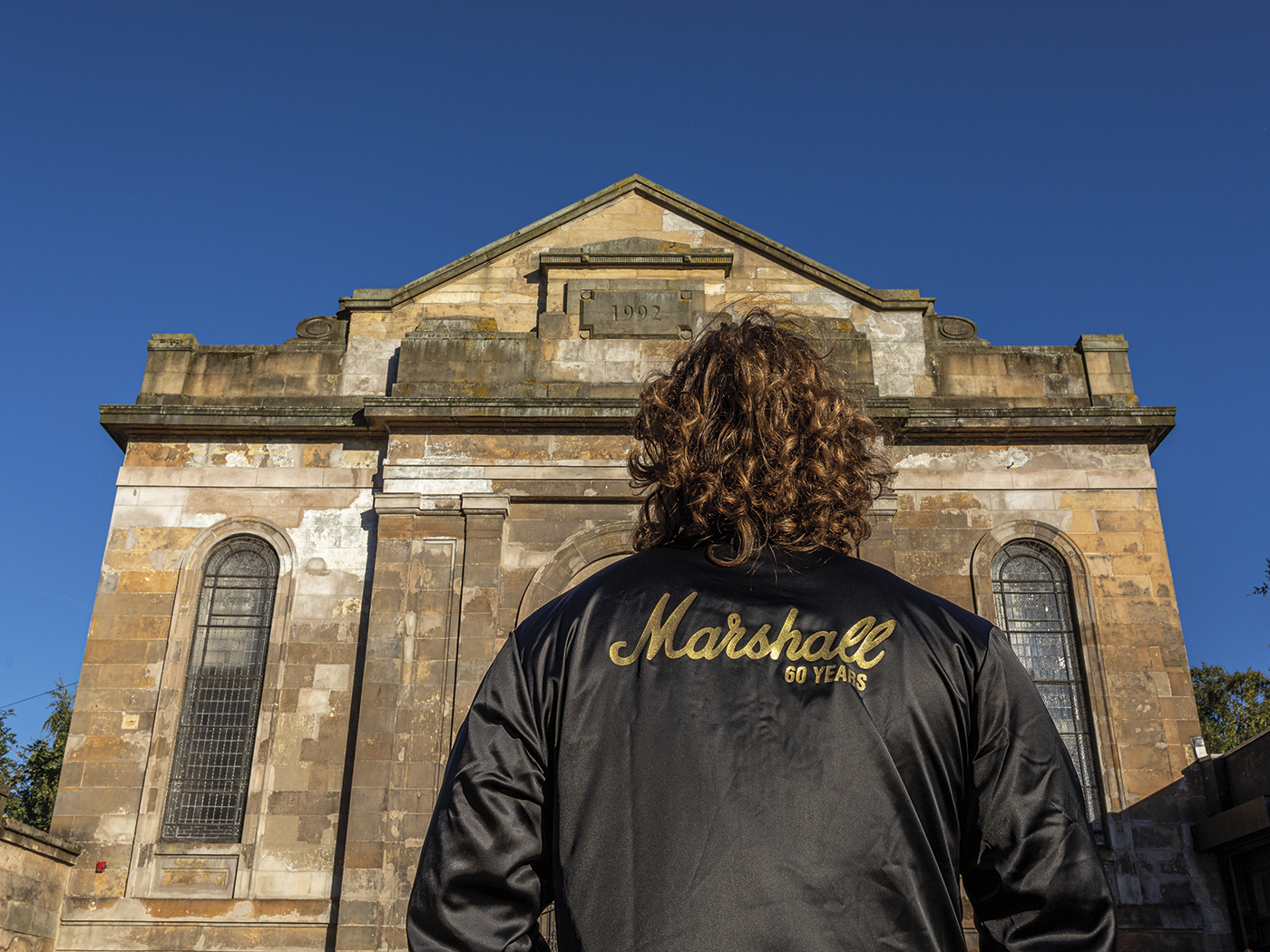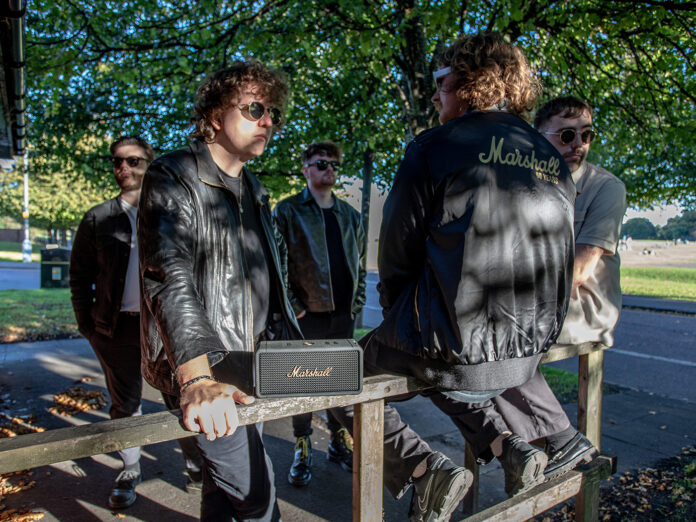In partnership with Marshall
In partnership with Marshall
As they bicker genially over afternoon pints in a Glasgow beer garden, Gallus can agree on one thing. “We want to have fun,” says singer Barry Dolan. “That’s the goal for us. The best thing about live music is seeing a band having the time of their lives. We want people to come and forget their problems and let off steam for 45 minutes.” And the old friends go back to happily squabbling about which member originally wanted to name them The Alphabets, whether Frank Sinatra played Celtic Park or Ibrox, and how many songs they managed to get through at their debut gig before running out of material.
The Glasgow five-piece were founded by cousins Eamon Ewins (guitar) and drummer Paul Ewins after they left university and realised they needed to find something to do. They recruited Dolan, a pal they hung out with at Gallus, the bar near Kelvingrove Park that ultimately supplied their name – it’s a Scottish word for bold or confident. Although Dolan had never sung before, he had studied acting so the Ewins figured he might provide the stage presence the other two were lacking. The plan worked. After making their debut at the city’s legendary King Tut’s, Gallus were soon carving out a reputation as an unpredictable and entertaining live act.
Fast forward a few years and Gallus signed to Marshall to release their 2023 debut album, We Don’t Like The People We Become, a series of punky songs fuelled by that heady combination of anxiety and adrenaline. Accolades have continued to follow, including being named Best Rock Band at the Scottish Alternative Music Awards in 2022 and shows supporting Biffy Clyro up the road in Edinburgh.
Now featuring second guitarist Gianluca Bernacchi and Matt McGoldrick on bass – both formerly of Paisley’s Vegan Leather – Gallus are preparing to unveil a new approach for a December tour supporting fellow Glaswegians Dead Pony, which will include shows at the Garage in London, Leadmill in Sheffield and The Deaf Institute in Manchester.
“A lot of the album is quite sad because we wrote it in lockdown,” says Eamon. “We wanted to write stuff that is a bit more upbeat as Matt and Gian have changed our sound a bit. ‘Wash Your Wounds’ is about how things in Britain are shit if you are young, but feeling sorry for ourselves won’t fix anything.”
That bullish attitude has long been present in Gallus live shows. When bassist McGoldrick first saw the band perform in a Glasgow dive bar, he was impressed by Dolan’s ability to command an audience. Stunts are part of the fun. At one recent gig, Dolan pulled out his phone and FaceTimed McGoldrick while he was on holiday, encouraging the audience to chant an impolite greeting to their missing bassist and his bewildered girlfriend.
“We have more of these off-the-cuff moments,” muses Paul Ewins. “We might have to start subbing out songs for bits.” Dolan feels humour is important as a way of building camaraderie with their fans. “We want to make the crowd feel like part of the show, because if they are involved they are more inclined to have a good time,” says Dolan.
Gallus cherished the opportunity they were given to record We Don’t Like The People We Become at Marshall’s state-of-the-art studio in Milton Keynes. Being on the label gave them access to equipment and experiences that would otherwise be far beyond their reach, with a huge live room, Neve console, Natal drums, experienced engineers and access to the factory next door to fine-tune their Marshall amps. “They are very artist-friendly, understand the music scene and run the label as a way of developing bands,” says Paul.
The group want to take the experience they have gained at the Milton Keynes studio into local Glasgow studios. Bernacchi will produce their forthcoming EP and new songs are already bedded in. As well as “Wash Your Wounds”, Gallus have one inspired by Coronation Street serial killer Richard Hillman called “Cool To Drive” and another called “Depressed Beyond Tablets”, a title borrowed from a Brass Eye sketch. The topics are serious, but the approach is playful. “We are playing to our new musical strengths, which are a lot more energetic,” says Dolan. “We want to really throw ourselves into the music.”
City To City: Glasgow
Gallus conduct Uncut around some of their home city’s significant spots

Although Gallus are named after a pub in Glasgow’s West End, they arrange to meet Uncut on the other side of the city at St Luke’s, a converted church in the East End. That’s partly because the 600-capacity St Luke’s is a venue that the group have twice headlined, but it’s also because they now avoid Bar Gallus after an acquaintance stole the door from a toilet cubicle. That’s a very Glasgow reason to be barred. This is as hedonistic a city as any in the UK, and therefore a great place for young bands to take their first steps.
“One of the great things about Glasgow music is there is always a history of bands,” says Dolan, who cites groups as diverse as Mogwai and Biffy Clyro as influences. The small size and friendly nature of Glasgow creates a unique scene, in which superstars rub shoulders with fans. Bassist McGoldrick talks about the importance of seeing Franz Ferdinand in local bars, venues and record shops as he was growing up. “Franz Ferdinand were the quintessential Glasgow rock band,” he says. “They had a buzz about them and were approachable. Being 16, 17 and having them right in front of you was really exciting.”
While bands like Franz Ferdinand and Belle & Sebastian coalesced around the 13th Note – since closed – the key venue for alternative guitar bands of the 2010s was the Priory. Located on Sauchiehall Street and run by Gallus’s manager, it was a home for young bands and a testing ground – if you could win over the Priory audience, you had fans for life. Gallus were regulars – on stage and in the audience – though the bar closed in 2023. Fortunately, there are still plenty of other grassroots Glasgow venues such as King Tut’s, St Luke’s, Stereo and Mono.
St Luke’s and Mono are participants in one of the biggest events of the year for Glasgow music, the Tenement Trail. “It’s a festival that takes place at venues all around here,” explains Eamon. “All the venues have bands playing through the day, and it’s like a neighbourhood all-dayer.” Dolan describes it as “one of the best things about Glasgow. It’s given us a platform and it’s great for local bands.”
The East End is also home to Glasgow Green, which hosts the annual TRNSMT festival, another event at which Gallus have performed, but the area is best known as the location of Barrowland, the legendary ballroom that has hosted just about every Scottish band of distinction as well as groups from all over the world. When asked which venue in Glasgow they’d most like to play, the members of Gallus answer as one: Barrowland. “It’s the pinnacle for any Scottish band,” says Dolan. “International bands have said it’s the best venue in the world.”
A headline spot at Barrowland is well within their scope. It was Gallus’s reputation as a feverish live act that first brought them to the attention of Marshall, who were quick to see the potential. “Their head of music loved our song, ‘Fruitflies’, and signed us after we sold out King Tut’s in our first gig after Covid,” says Eamon. “It was really quick between hearing they were interested and us going down to Milton Keynes to record.” That journey down to Buckinghamshire was made easier by access to Marshall in-ear Motif earbuds – essential items for a group where five different members with five different musical preferences are all cooped up together in one small van.

Thanks to Glasgow’s long history as a music city and its location in the centre of Scotland, the city boasts the other important features of a thriving music scene. There are excellent record shops like Monorail, the cheap utopia of Missing Records near the station and Assai on Sauchiehall Street. The latter is an independent Scottish chain that celebrates Scottish music with in-stores and signings for local bands. There are also excellent recording studios, many run by older Glasgow musicians such as Mogwai’s Castle Of Doom, while the long-running Carlton Studios is an indie institution that includes rehearsal rooms and community spaces.
Music is embedded in the culture of Glasgow in a way seen in few other cities. It’s in the numerous karaoke pubs and bars, the festivals, the abundant record shops – even the pipe bands, buskers and bagpipes that are found on every other street corner. And the existence of that music encourages young bands like Gallus – and all the other Glasgow bands that came before – to have big dreams. “The Hydro is one of the top five big venues in the UK, so there is that appetite for music in Glasgow,” muses Paul Ewins. “Barrowlands still has a gig basically every single night, there’s the Academy on the south side. People want to go to gigs.”
“You see guitar bands like Idles and Fontaines playing the Hydro – that’s something you might not have seen a few years ago and that gives us hope,” says Dolan. “To see bands you can identify with performing at such a high level – that’s really inspiring.”




